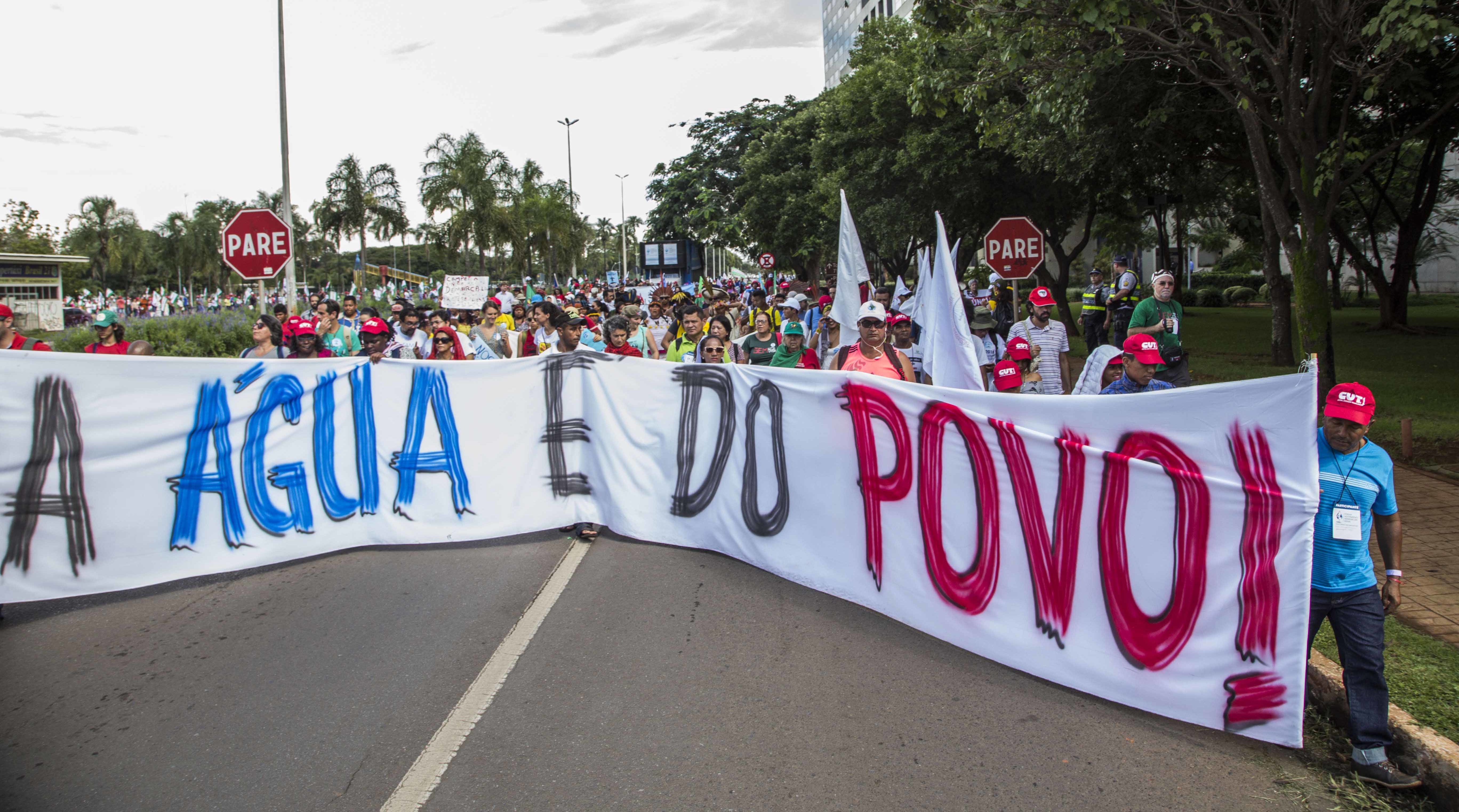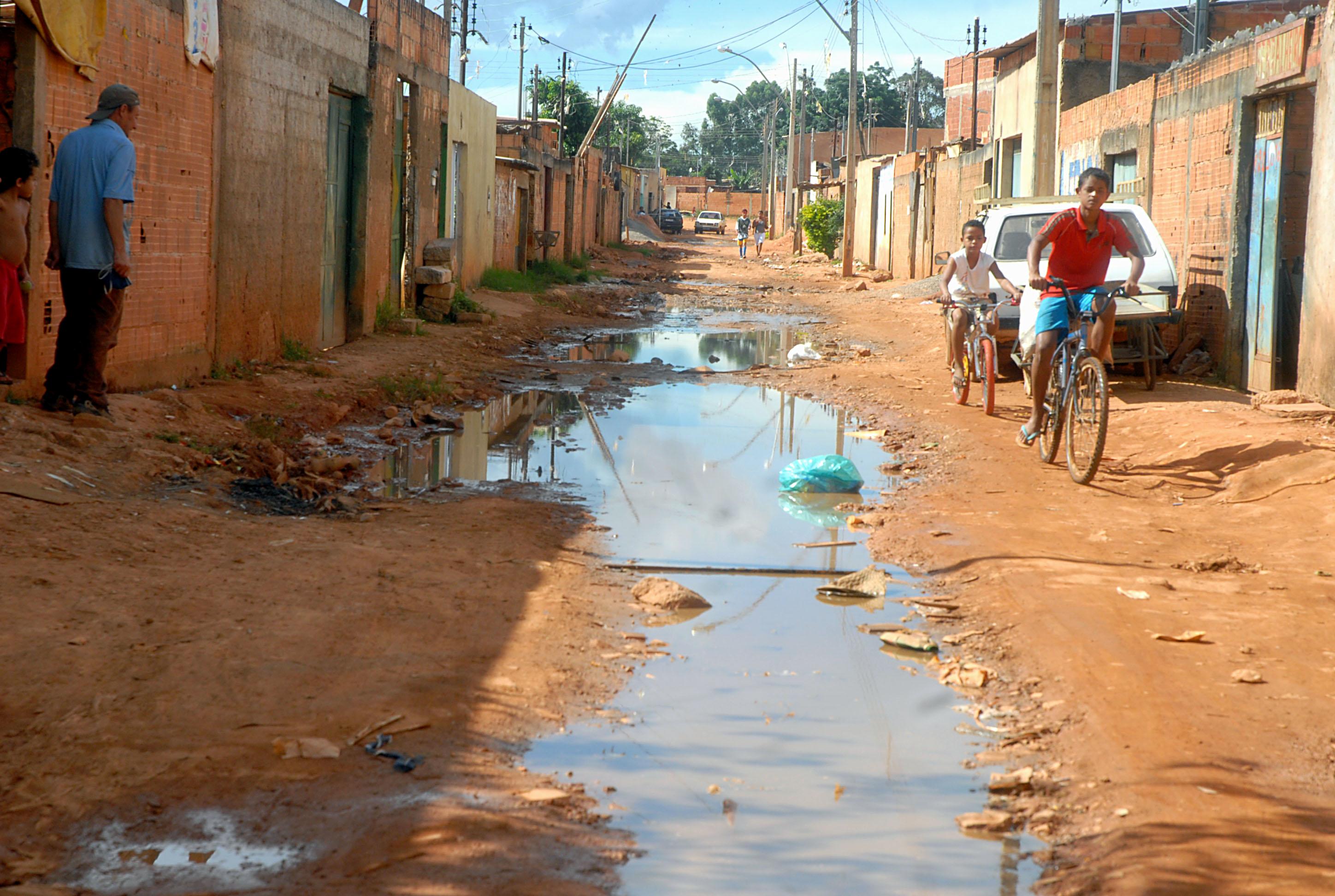17/07/2020 12:05
Caroline Rodrigues¹
A movement to commodify water and sanitation in Brazil was already on the table at the 8th World Water Forum, held in Brasilia in 2018. Since 1997, that Forum has been a meeting place for private corporations that lobby government decision makers and seek to influence public opinion in favor of privatizing water resources. In the Brazilian case, the funders of the 8th Forum exemplify a promiscuous and typically neoliberal relationship between the State and corporations, with 40% of the costs of the event subsidized by the federal National Water Agency (ANA), 40% by the United Nations and 20% by the corporations themselves (Nestlé, Coca-Cola, AmBev and GDF Suez SA).

March to the Globo TV Network headquarters in Brasilia. (Photo: Rosilene Miliotti / FASE)
At the time, FASE and several other civil society organizations held the Alternative World Water Forum (FAMA) to denounce attacks on the right to water and sanitation at the 8th Forum. About 7 thousand people made a beautiful march whose motto was “Water is a Right, Not a Commodity”.
There is widespread acceptance of the idea that turning public services over to private enterprise is the best, most efficient way to ensure universal access. We must clarify, however, that this public management approach is fraught with unfounded assertions. The World Water Forum’s own slogan – “Sharing Water” – belies that illusion. Their motto creates an expectation that the entire population will share the water, while hiding the corporations’ economic and political wrangling to capture their country’s waters. The passage of Bill of Law 4,162 on June 24, 2020 is a sad example of their agenda since 2018, namely private control over water resources and sanitation services.
Bill 4,162 poses risks for the poor
The approval of Bill 4,162 (signed into Law 14,026 on July 16, 2020), which amended the federal Public Sanitation Regulatory Framework, is one more attack on social rights and democracy by Jair Bolsonaro’s government, Economy Minister Paulo Guedes and the 65 senators whose favorable votes displayed their commitment to the government’s ultra-neoliberal agenda.
FASE, along with several other civil society representatives such as the National Sanitation Observatory (ONDAS) and the “Good Water for All Campaign” opposed the bill as a threat to the universalization of public water distribution, which today only reaches 80% of Brazilians, as well as the universalization of sanitation, available to only 50% (data source: National Sanitation Information System – SINIS).

Too little water, while the sewage overflows. (Photo: Valter Campanato/ABr)
One of the main problems posed by the approval of Bill 4,162 is its impact on the health of the Brazilian population, already ravaged by the Covid-19 pandemic. Its approval puts an end to the “cross-subsidy” mechanism in public companies that allows areas with greater capacity for payment in a given city, such as the southern zone of Rio de Janeiro, to fund projects to expand the system into lower income areas, such as Rio’s Baixada Fluminense. There will now be fewer upgrades to the water supply and sanitation infrastructure, because big “water and sanitation market corporations” will not invest in unprofitable areas such as small cities, rural areas and the peripheries and slums of large cities. It is no coincidence that these areas have suffered the greatest shortfall in infrastructure.
Another problem posed by the approval of this bill is that water bills may get very expensive! This has already happened in cities where services were privatized. With corporate control over sanitation services, authorities leave the poorest population hostage to a private service, with no competition, and powerful enough to postpone or never upgrade the system at all, alleging that “It is not part of our master plan to invest in this area now,” “such an investment is risky for our financial stability,” “this type of investment will not bring an economic return,” in short, a plethora of arguments focused on profit rather than ensuring anyone’s rights to water and sanitation.
A view from the commons
While such neoliberal thinking has been hijacking the state for years, a view from the commons can help us create new political horizons, new paradigms for public management, especially water management, with essentially anti-capitalist outlooks.
 Water is a right, not a commodity. (Photo: ABr)
Water is a right, not a commodity. (Photo: ABr)
But what is a common good, or the commons? The answer depends on the historical context when the question is raised and the theoretical perspective one adopts. But are the commons something material? Immaterial? Where do I find them? We believe that any attempt to categorize water, earth, air, landrace seeds and free software as material commons, and knowledge, languages and culture as immaterial commons impoverishes the discussion. Far beyond the substance, the essence, of what will be communized², a debate on the commons helps us rethink the social relations established to produce a common good. It allows us, for example, to wonder about our relationship with water: is it a service to be consumed or an essential part of life?
For most residents of the city, water is perceived as one among many products they buy, access to which depends on paying for the service, with money. This means that there is no relationship of belonging between the population and the water it receives. Few know what biome their city belongs to, which river basin supplies their home, which major rivers flow through their region, where the sewage from their home goes or how it is treated – if it is treated at all.
We believe that the commons approach helps denaturalize the commodification of water by focusing on collective practices established by groups with each other and with nature. Where a group has no such relationship, as is the case of many city dwellers, the commons paradigm proposes building a closer relationship between humans and nature that does not depend on professionalization, competence or purchasing power.
One alternative that our struggle for water has found in the commons approach is that it advocates defending public services as public institutions. In a country like Brazil, it is not enough to defend the public interest per se, with a State long shaped by personalism, patronage and despotism, historical traits now being blended into a recent militarization of politics and territories. The commons approach can help us confront governmental bureaucracy, the corporatist culture of civil service, the centralization of public information, institutions that do not interact to enable governance, doors that remain closed to the population, etc.
The defense of public services as public institutions thus recognizes that public services are not just tools for public authorities to exercise their power, but social institutions intended to meet the needs of the population. This means that such services are spaces to work out tensions and struggles. Neither are they simply “state apparatuses” at the service of bourgeois rule nor are they agencies entirely at the service of society. The crucial point, therefore, is how to turn public services into common-use, rights-oriented and democratically governed institutions.
[1] Educator at FASE’s program in Rio de Janeiro.
[2] Managed in common or through a community.










